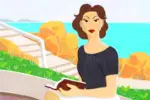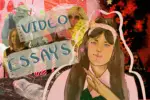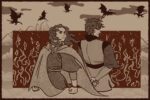For years, videos of all varieties have called YouTube home, including the old-school, weird cat videos and home recordings. Then the platform developed, and sketches, challenges, music, gaming, beauty videos and vlogs stormed onto the scene and collected subscribers by the millions.
But there are still niches relatively unknown by the general populace, and BookTube is one section that deserves more recognition than what it currently receives.
BookTube: a Summary
BookTube is exactly what it sounds like. Books are the focus, and the creators deliver their likes, dislikes, reviews and hauls. Reviews for the book-to-movie adaptations are in abundance, almost as popular as vlogs reiterating how awesome it was at the most recent book signing/VidCon-esque event.
The books discussed range across all sorts of subjects and genres, though young adult fiction dominate the scene. That makes sense considering YouTube’s viewers are generally millennials or younger.

As with the other ends of YouTube, challenges and tags run amok, like the Unpopular Book Opinion Tag and the First Sentence Challenge. These are fun to play and have endless options because there are so many books, and it’s easy to participate at home. Audience participation attracts a crowd even online, so it’s no wonder that these videos draw people in.
English-speaking BookTube isn’t even as popular as Latin-American BookTube. It has creators who boast thousands more subscribers than their counterparts. Each side often discusses the same books, and that universality is remarkable and usually only found in the world of sports or music.
Passionate Creators Infecting the Youths
The creators come from varied backgrounds; many do not have literary degrees, though many do. Some are also writers, while some work in accounting and just really love reading and discussing the latest novels. They all share the enthusiasm about authors and new releases as the rest of us book lovers; when they meet their favorite authors, the viewers cheer with them because if those fans can meet their idols, then why couldn’t others?
The enthusiasm is infectious. Loud voices, waving hands as they hoist their newly purchased novels into the air, so unapologetically happy about literature that my high school English teachers would weep with joy. BookTube is the safe space for their curious minds as well as the minds around the globe whose friends don’t share the same love for the written word.
An Introspective Community
BookTube is a space that is self-critical. The members recognize issues that often surround literary works — diverging opinions, “correct” analyses and what classifies as “higher” reading material — and they discuss it via videos.
Other spaces in YouTube don’t necessarily share this self-reflective feature. It’s not surprising considering that the channels are often focused on a discussion-based environment that values reflection, but this variance is still striking.
In one such video, called “Is BookTube Educational?” by BookTuber Ariel Bissett, there is an incredible amount of research in the forms of interviews with other BookTubers and literature on pieces of the subject. In all fairness, Bissett is known for her intelligently designed videos, and you could consider her one of the high watermarks for critical thinking on BookTube.
She’s not alone in her imaginative critiques, and videos of all varieties of discussions can be found across YouTube. The content you’re looking for is there; all you need to do is look and listen.
And So the Circle Closes
In no-nonsense terms, this is what BookTube is. But BookTube is more than tags, book hauls or 24-hour read-a-thons. BookTube represents and reflects upon the heart of humanity: storytelling.
Before the written word, people passed their messages and information about how the world worked through oral traditions. “The Iliad” and “The Odyssey” are often accredited to Homer, but it is speculated that Homer is not a single person, especially considering no one knows biographical facts about him — or if Homer is even a “him.” Those epics are products of years of oral traditions, morphing as each storyteller relayed their version of the tale.
BookTubers are some of the internet’s keepers of oral tradition. Video in general does this job, but BookTube becomes meta because its videos relay a narrative of one person reflecting on another narrative.
The individuals in BookTube are part of a larger picture. The books they choose to tell their viewers about say not only something about them but also about society. The books that they share often spread like wildfire, and, if the reader deems that the story has value to them, those ideas contained within the pages will fester inside their mind.
Homer’s epic tales would have died if the society that told their stories held different values. Society and literature push each other to move forward and to see themselves clearly in the light. If society approves, the book moves forward; and if the book moves forward, then exposure to those ideas increases.
Authors do the imagining and the grunt work of writing itself, but without an audience, the stories cannot live in the minds and hearts of others. BookTubers, and readers generally, contain the power to be like Homer and sing to the highest mountains and to the camera about their well-loved tales.
Reading is a solitary activity. Book clubs and upper crust academic settings are the places to speak about books with others, but unlike sports or music, it is not popular to discuss them outside of a classroom. The internet has the power to change that, and BookTube is a driving force in removing those barriers and reminding everyone that they are a storyteller.

















